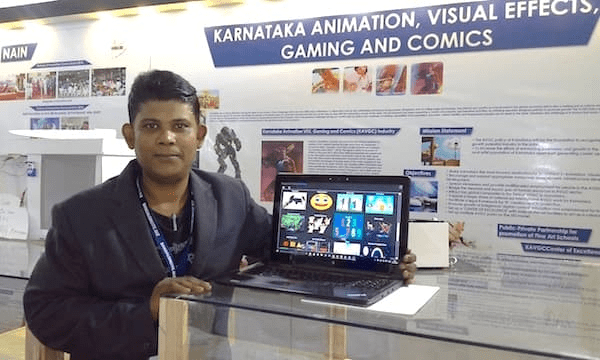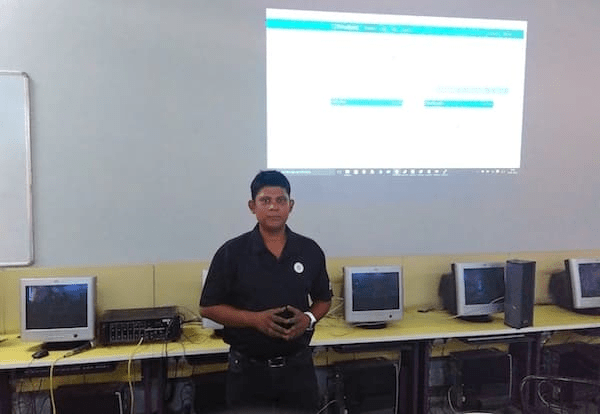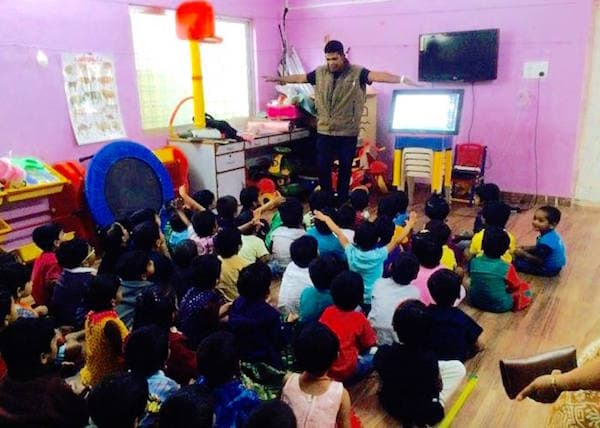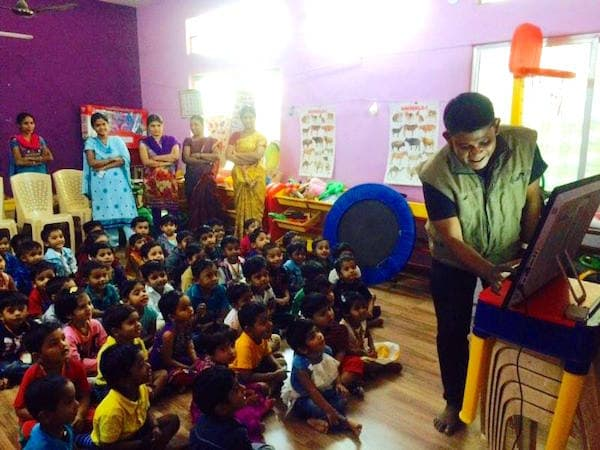
Administrator • 8yrs
How Engineer Turned Entrepreneur Rupam Das Uses His Love For Coding To Solve Real Life Problems
Born and brought up in Gulbarga, CEan @Rupam Das is no ordinary engineer. His work till date is the best example of what happens when sheer passion and dedication meets the big and bold dreams. An electrical, electronics and communications engineer by degree, Rupam was always fascinated by coding. His love for programming led him to pursue M.Tech and Ph.D. in Computer Science.
He is an avid blogger, photographer and a cycling enthusiast. When he isn't spending all his time solving real life problems with his ingenious technological solutions, he is either helping engineering students build crazy, useful stuff or spending time with his son and taking inspiration from his learning abilities.
Rupam Das successfully runs Integrated Ideas, a Research and Development Consultancy company based out of his home-town Gulbarga, Karnataka. CrazyEngineers community is fortunate to have CEan @Rupam Das as its dedicated member since August 2011.
In an exclusive interview with us, we got Rupam to share his journey from being an average guy in school to a passionate hard-core engineer, to running his own startup, winning national and international awards for coding to helping engineers grow their own startups. If Rupam's journey doesn't inspire you to pursue your dreams, we don't know what will.

Rupam Das, Founder - Integrated Ideas
CE: Tell us about your growing up years and family background.
Rupam Das: Start of my life wasn't great. I lost my mother when I was two months old. I was brought up in Jamshedpur by my grand parents. I have grown up knowing and calling my grandmother as "Ma"(Mother) and my grand father as "Dada Baba"( Older Father). I had my schooling from Shyama Prasad Vidyabhaban, a Bengali medium school. My grandparents were awesome and I will always be indebted to their sacrifices and the love they had for me. My grandmother was a headmistress in a Government school. Therefore "education" and "studies" were very important parts of our home. I was fortunate because my dida will teach me daily and I was in a great routine. I was also fortunate in a sense that my maternal uncle (Mama) was a Math genius having scored 100 in all his Maths exams after his class X. He was quite instrumental for my love for maths. He still has a great influence over my overall intellect.
Growing up years are still some of the most memorable years of life with friends like Rajesh, Shreerup, Sourav, Angshuman, Sanjay, Indrajeet who were always caring and fantastic. These guys were always special and continue to be so even though we rarely get a chance to speak.
I could never sleep without dada baba beside me. He is one of the best story tellers I have ever met in my life. Every day, he would tell me a story from our actual root Bangladesh. He had so many stories and he could tell them with such fantastic ways. His demise a few years back has been one of the most devastating incidents in my life. As I would almost always get to listen a story from dada baba, I have a natural liking for stories and that liking has a tremendous influence in my intellect and my work.
I completed my matriculation in Jamshedpur and came to Gulbarga to study PUC. My PUC studies were haywire and I could manage just a first class in PUC. CET result was good but I wasn't getting Electronics and Communication in any of the top colleges which I always wanted to do. So I ended up taking admission in HMSIT, Tumkur, a relatively new college.
It turned out to be a blessing in disguise in many ways. The inexperience of teachers and the fact that we were first batch of VTU and the very fact that "notes" and "guess papers" or "T20 Books" were not available, we had to read all the text books and reference books. This gave me immense satisfaction and I understood deep learning stuff.
During my engineering I hardly ever practised anything on notebook. I always focused on building my conceptual foundation and relied on writing on exams based on my concepts. This "not mugging up" attitude had caused me "marks" but helped me immensely in my career.
My engineering days were great memorable days. I can possibly write a book on it.
CE: We came to know that you had the bug of entrepreneurship from a very young age. In fact, you started your first business when you were in class 7. Tell us more about it.
Rupam Das: People often get into entrepreneurship either to pursue their love for something or to solve certain problems. For me, it was the second one. I loved reading books in my school days. Needless to say money would always be a constraint. I loved reading comics.
In our childhood those were possibly the only colour thing we got. Chacha Chowdhury, Super Commandio Dhruv, Nagraj and so many. Every week there would be a new edition of these comics with periodic bumper edition.
The comics used to cost about Rs. 6 (if I can remember well) and bumper editions (with little more pages) will cost about Rs. 15. It was big money every week. So I started a comics library at home. I had about 50 other subscribers from whom I collected Rs. 50 each as subscription fee. They had to pay Rs. 1 for reading a comics for a day. So I would be able to buy all new comics from my primary "fund" and then rent them. It was quite successful. I probably ran the business for about two years ending up with a net profit of over Rs. 7000. I had to discontinue it when I was in class iX due to preparations for matriculation.
CE: How was your experience working for Hutch (Vodafone) and CBK infotech?
Rupam Das: Hutch was my first job. I was recruited as Junior Engineer for fibre optics assistance. But I realized that there was not much technical about the job and I was essentially doing a "marketing job". Pay was good. But as I wanted to be in technical stuff, I was really not happy with the job.
I had quit the job exactly on a month on the day of my first salary and without taking it. I realized that if I had accepted the salary, I would never be able to leave that job.
So yes, it was a month. But I learnt the art of talking and meeting people. I was an introvert all through my life and Hutch days helped me to overcome that.
CBK Infotech was my second job where I learnt programming. It was into SME, device drivers and student projects and I had done pretty well. I used to write device drivers with VC++. After a year I called it a quit. I realized that I would not be able to continue with the job as working under a manager with less knowledge and virtue made me agitated.
On 23rd August 2003 I left my job in Bangalore to come down to Gulbarga to establish Integrated Ideas. And I am still running the company.
CE: How did you turn to teaching profession?
Rupam Das: When I started Integrated Ideas, we mainly were building a software for traders. I realized that I do not have enough burn to run the company. So I had to figure out ways to generate revenue that would earn us some money to survive. I started taking some student projects purely for survival. But soon it turned out to be our core business with students flooding from all parts of North Karnataka and from all branches. We started training courses too.
Though we were still building and distributing customizable software, we had mainly become a 'Training Company". In next few years I had spread the training business and had several colleges signing MoU, a branch in Ahmedabad, Hyderabad, Coimbatore. As I was mainly helping the students, I was automatically into teaching profession.
Though training is now only a small part of Integrated Ideas, I love teaching. I take various workshops and try to guide students at different levels. However I am more of a coach than teacher. I prefer to help professionals shape their knowledge in a positive way rather than "teaching" them. So yes, I am into coaching profession.

CE: When did you decide to start a venture of your own? What made you to start Integrated Ideas?
Rupam Das: Integrated Ideas was started for two reasons, a) I could not accept the way company structure works and b) I rarely was doing what I wanted to do.
I wanted to do several things. I used to get bored quickly once a particular problem is solved. I had no other options but to open a company of my own and do what I like to do.
Because I never had enough capital to do business, I opted for Gulbarga. It is a great place for bootstrapping your business. Low cost, no traffic, great train and road connectivity. Integrated ideas was supposed to be a partnership company by me and my room mate and one of the best friends I have ever made in my life, Indrashekhar Chakroborty. So the name 'integrated ideas'.
However, his parents were not really happy with him starting a business. Bengalis would not do that you know. So, he had to back off. But I went ahead with the name. it made a lot of sense.
CE: We learned that you also started a website called grasshoppernetwork.com. Tell us more about it. What went wrong that you had to abandon that site?
Rupam Das: As I said, I often get bored with monotonous things. It was in 2010 that I realized that "student based business" is not going to go anywhere. I was already in business for 7 years without any kind of growth. Year after years, it was same flat revenue. So I wanted to close down Integrated Ideas and get into some other business.
In 2011, I formally started grasshoppernetwork.com, a site to share my knowledge and to build a student community to solve problems and help each other. But it was too much of work which really was not working out economically.
I worked in the site for about a year. But it taught me Web development, SEO and how web business works. As the business was not enough profitable and more so had me doing the same thing that I do for Integrated Ideas ( but in virtual world), I completely lost interest in the project. The site still exists but I have never logged in for over two years now!
CE: Tell us about your success story of becoming the Intel Software Innovator.
Rupam Das: Intel in many ways has been the satisfaction I always wanted in my life. In many ways, it completes me as a professional. Intel is one of integral part of my professional identity and achievement.
It all started in 2012 when I participated in Codeproject's 'Intel Ultrabook App Innovation Contest'. I got an Ultrabook for Intel and reached finals of that contest. Though, I could not win anything, it gave me an opportunity to be in consumer products.
I participated in several Intel competitions from then and won several awards. I was supported by so many people from Intel. Intel Software Innovator program is literally a community driven program where freelance developers working in Intel technologies are hand picked by Intel and are given access to unbeatable technical and human resources of Intel.
My dev friend Abhishek Nandi, first Intel blackbelt from India played a major role in enrolling me into this program. I love Intel as a company, but more so the great people working over there. I continue to take several workshops in Intel technologies.
CE: What is Integrated Ideas is all about? Tell our readers more about it.
Rupam Das: I believe I have said almost everything that we do in Integrated Ideas. But I want to tell you how we have changed and evolved. Basically Integrated Ideas was a software development company for SME, changed to Training and Student project company, then into a web development company, then to Ultrabook App development company, then Android Custom App making Company and so on.
I wanted to close down Training Business, almost every year since last many years. But I realized that my passion and love for students will invariably get me to work with the students. So, I have realized that I will never ever be able to stay away from students. Therefore I had to balance this business with my other pursuits.
In 2012, I closed down all the courses. We were teaching Java and .Net and Unix C and many more courses. It was big revenue. But I completely shut it down. It was difficult at the beginning but gave me a lot of spare time to do other things. Looking back at that decision, I feel really happy and find it to be most important decision I have taken for the company.
Student projects was another thing that I wanted to close down but I could not. Between 2007-2009 I have done some seriously bad stuff. This included flawed design, bad coding, bad training and many more bad than good.
As, we were huge student project company at that time, I really never cared for anything other than the money we were making. But slowly I realized that I as coder am fading. My skills going away every day and I am not doing anything that I must do. I was not learning anything new and I feel I was not teaching well to the students too.
In 2010, I took another decision that was very critical. I decided to hike up project cost and take as low number of students as possible.
I started rejecting students whom I did not feel could work in their project and reduced "volume". This gave me enough quality time with each batch. Slowly I stopped taking any repeated projects, and started accepting projects with significant technical challenge. This meant that I had to work really harder for every project. This was a turning point.
I was doing some amazing coding and was possibly solving too many difficult problems. Every year I have reduced number of students I work with and start looking for more and more critical projects.
It resulted in a repository of great codes, great solutions and immense professional satisfaction. I have now taken this to next notch where I am focussing on turning these student projects into startups. From word go, my preference is those students who ideas looks good for a startup. I hope I can share few of the success stories by the end of this year.
Rupam Das: You have built a nice online store of Matlab Source Code for different uses. What are those? What are its advantages?
Rupam Das: This one is really a bi-product. I wanted to continue to have an online business but not with AdSense. I decided to sell some codes instead of earning from advertisement revenue. I started recording all the classes I would take for the students and used to upload them in Youtube. Many people would leave a comment there asking for the code. So I started experimenting with few codes at a lower price.
Our online store is now $20k yearly profit making business. The amount is small, but it gives me immense satisfaction that we have sold over 5000 codes in over 80 countries. This is not intended to be a Matlab store, but turned out that I was solving more Matlab problems which people are looking for then anyone else. This store has also improved the way we do student projects. Now the focus is on quality code that can be sold. So, yes a win-win for everyone.
CE: What is Rainbow App all about? Who is it for and what are its major highlights?
Rupam Das: Rainbow was a simple animation product that I had created for my son. It intended to give him a platform to create his own animation. But slowly I started building many learning activities on it. Puzzles, Odd thing out, select the match, pair matching, coloring, building blocks and many more.
It was sometime near Diwali in 2015 ( November) that I thought why not talk to some schools and ask teachers about the prospect of the product in Kids training. I got an unbelievable response from every teacher. So on November 15, I decided to create a company and business around the product called Rainbow Edu Labs. We have converted entire syllabus of Nursery to class II into Rainbow Activities. This bridges the gap between teaching and learning.
Kids love playing games. Teacher have to teach. Kids don't like to be taught. So we provided a platform where teachers can play in the class and kids can play with their teacher. The whole "playing" thing teaches them a particular lession without kids realizing that the class is going on and teacher having to repeat "Silence please" as there would be immense participation by the students.

Seven schools so far have adopted Rainbow. It is still in it's infancy. So we are coding, creating content and marketing the product everyday. This startup needed lot of cash to survive. I had a lot of presentations and met a lot of investors for the startup. But I have not been able to convince them to have a serious look at it because Rainbow was not clone of any other successful product and it was often too new for their comfort. There could surely be other reasons but I analyzed it this way.
So, in order to keep rainbow alive, I decided to fund it myself. Every single money that Integrated Ideas makes is given to it's younger sister Rainbow. We are short on cash but not on enthusiasm. In between I participate and manage to win quite a few cash rich contests. Those prize money is literally funding Rainbow.

This is close to my heart and I would pursue this. I personally teach kids with rainbow and love every seconds of it. So I want more and more kids to use it so that I can teach more and more kids ?
CE: Tell us about your family life. We heard that your wife Moumita is also your business partner. How do you manage work life balance?
Rupam Das: Well, in many ways I am fortunate to have Moumita as my wife. She is an engineer herself and a quality engineer. In 2008 we got married and six months after the marriage we had certain unavoidable situations which lead to bankruptcy and literally loosing the whole business. Having my account frozen, no cash, I had to stay in platform with her, for about 7 days. It was difficult for me.
I wanted to go to Bangalore, take a job and get settled. She said, we are not going anywhere. We literally started the business in platform, survived with bun bread for a week. Any other woman would have possibly given up and gone back to her parents but Moumita stayed in, encouraged me to code. I handled few students in platform itself ( I still thank them). We had some money and took a different building. I started a .Net course where we had to ask the students to sit on ground ( having no mat to offer). They did and we could start afresh from there. We fight a lot ( as probably all husband and their wife ? ) but we discuss and solve the problem. She is backbone of the business. Whenever we run out of employees or don't have enough resources to continue a project, she would step in and take up the responsibility. She is also pursuing her studies. We have no maid or family support to look after our home or baby. So she has to manage baby, prepare food, study and look after the business. At the end of the day, more than me it should be her who should get the credit to keep Integrated Ideas alive.
Had she not been part of my life, I would never have lived in platform to fight out to restart the company again. Support of partner is an integral part of any entrepreneur's life and yes, they often don't get the accolade they deserve. But, I am indebted to her and her support. She is a sheer iron lady and magnet of our family and business.
CE: What is your future vision for Integrated Ideas? Where do you want to see it 5 years down the line?
Rupam Das: Integrated Ideas will slowly become technical accelerator of startups. We have started that journey. Every year we will work with some students in their project and will turn them into startups. We will try to have a portfolio of some great startup companies. We now have three in our portfolio. I believe in 5 years we would at least have equity in 50 companies and would create a startup ecosystem by then. Training will still remain a part but in a different way!
CE: What is your definition of entrepreneurship? What do you love most about being a startup owner?
Rupam Das: I am not really a theory guy. So definition and all are things that I never care. But I believe that entrepreneurs are there to solve problems and turn the solutions into profitable business.
- I love everything of being an entrepreneur.
- I love the fact that often I would know that there is no burn for even 15 days and have to get some revenue for next few weeks.
- I love the fact that I can pick the problems that drives me crazy and try to solve it.
- I love that I can help people with my profession.
- I love the fact that I don't have to write any silly excel sheets.
- I love that I can work for 18 hours a day for years and still feel I couldn't put enough of my time into business.
- I love the fact that every subject I learnt in my life is used and I learn more.
But more than anything else, I love the fact that I am trying to change the society and lives of many people.
CE: What motivates you? How do you handle days when you feel down?
Rupam Das:
I like coding. I mean I really do. Coding is my religion. So, any technical problem that needs good coding to solve motivates me. I go crazy even with small output and never fail to demo it to my wife ?
Feeling down and lonely is part of ever entrepreneur's life. It is a difficult world really. You have to code, market, raise fund, keep the business alive, pay for your rent, manage family. There are so many times when you curse your fate and want to quit. Those times when nothing is working for you are really hardest. I am not good at handling those days really. I try to sleep early on those days. Next day waking up early and taking a long walk thinking about the problem often gives fresh ideas and energy. In many cases it is "Let's see off today and survive tomorrow". I also love cycling and often go for 70-100 Km rally. Those cycling hours gives a lot of fresh energy.
CE: Any message for young and aspiring engineers.
Rupam Das: Firstly never read a subject with the perspective to passing. Try to learn the subject as deep as possible. Reading the text and reference books always helps. Always do coding. I mean every one must learn coding. That is the single most important thing. There is never enough strong excuse for not learning how to code.
When you are in 3rd year, start thinking about a problem around you. May be your problem, you sister's problem, mother's problem. And think if that can be solved. Take that problem as your project. Don't fall for vague words like "Latest Technology", "IEEE papers", "Hottest domain". They don't work.
If you can pick up a problem critical enough and can start working towards that, your life's goal will be bigger. You will be more energetic and you can then put more effort in your project. Then create a startup out of that if you can. In college it doesn't take too much money. You can run a startup from your hostel room utilising college resources and hostel wifi. Bootstrapping is easy.
Working for your own product and company will give you a lot of satisfaction and encouragement. Nothing better than solving real world problems. If you do this you will basically have a "Work Experience" in a startup. This is also good for your job perspective as being 1 year experienced is better than fresh B.E. graduate.
Lastly, if you have an idea that looks stupid and you still want to pursue and you have the killer instinct to go through with the pain, come to Integrated Ideas. ?
